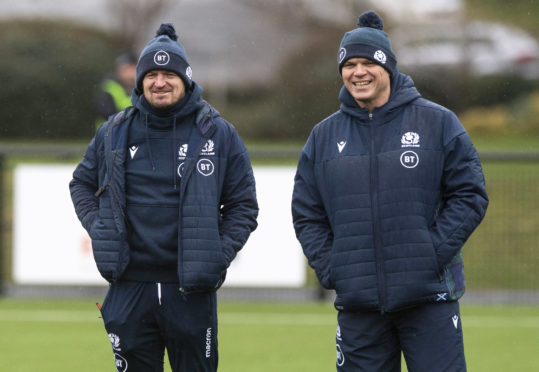Pieter de Villiers would love to stay with Scotland long-term – and the result so far suggest that Gregor Townsend and Scottish rugby would be wise to tie him down.
The South-African-born prop won 68 caps for France on the tight-head and is plotting the downfall of his adopted country this weekend with the Grand-Slam seeking French due at BT Murrayfield on Sunday, having signed a short-term contract for this Six Nations to be specialist scrum coach.
However such has been his impact that the Scottish front row has been immovable this season, having the better of the exchanges against Ireland and Italy and coming out at least even against England.
It’s down to hard work from all, according to de Villiers, that they’ve come so far so quickly.
“The players I’ve walked in on are top end players whose work on and off the field is excellent, whose work ethic is outstanding,” he said. “I think that’s the reason why we progressed so quickly, because the base was very solid. It’s been a real privilege to work with these guys.
“We got some quick results in certain departments which also speaks to what has gone before because when I went to Edinburgh and to Glasgow I could see that there was a lot of work ethic there.
“So it was a matter of a few changes here and there, a few suggestions. A bit if endurance work in certain areas helped, but I thought the base was very solid and that’s why they reacted quickly.”
Perhaps the quickest change has been with loosehead Rory Sutherland, who last played for Scotland three years ago and had played only a handful games for Edinburgh after a long comeback from injury.
“Rory is very driven, I could see a guy who was very happy to be back in the set-up,” said de Villiers. “There’s a lot of pride and a lot of honour for him to play for Scotland.
“He’s a hard worker, keeps his head down and gets stuck in. That’s worked well for him because he’s obviously got natural attributes, but working hard at this part of the game is really important and Rory has done that.
“He’s done well to keep his place because it’s hard to get there but even tougher to stay there. I know he’ll put the effort in.”
As for staying where he is, de Villiers is definitely open to offers.
“I’m enjoying it a lot,” he continued. “We’ve already spoken briefly and I’ll speak again with the Scottish Rugby officials, but from my side I’d definitely be happy to continue.
“When I coached with the South Africa national team I did work in a wider kind of role, working with coaches and younger players, but those are things for later – the job now is to scrum well on Sunday.”
De Villiers is not that far removed from French rugby, having coached at his long-time club Stade Francais most recently, and detects a change in attitude since the World Cup.
“Since the World Cup I think a lot of teams have been thinking about the way South Africa won with a specific type of gameplan,” he said.
“In the past the French have been successful with a physical approach and a strong defensive part to their game and I think that Fabien (Galthie) took the lessons out of the World Cup and has changed the classical way of playing French rugby.
“That said, the France players are still all natural flair type players who can finish off opportunities, but they’ve definitely gone back to a bit more of a physical approach with a good kicking game and good defence. That makes them a more dangerous side because they’ve definitely got powerful players.
“Fabien has given them a lot of structure, and the French love the running aspect of the game. They like using space and love the disorganised side of the game, so when structure is applied those natural finishing abilities come to the fore because that creates opportunities.”
De Villiers knowledge has been aligned to Finn Russell’s, the absent stand-off joining a coaches’ meeting by conference call on Tuesday to give a bit of insight into how key men in the French team operate.
“Finn is at Racing working with some of the players who play for France and some of the coaches who are involved with France so he is obviously invaluable for us in terms of information,” he said.
“There were bits and bobs of strategy and tactics in French rugby as well that we will hopefully use. That is the first time I’ve personally spoken to him. We spoke rugby, about technique and strategy.”
Scotland have also involved Johnnie Beattie, the recently retired former international No 8 who spent several years under Fabien Galthie at Montpellier, for some other insights they hope can help them.


